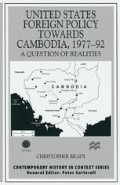Abstract
Jimmy Carter entered office with high expectations of significantly changing US foreign policy-making. He was committed, at least rhetorically, to a foreign policy which reflected and promoted America’s domestic values. Given such a predisposition towards human rights issues it might have been reasonable to assume that Cambodia would be high on his agenda for action. It was also reasonable to assume that when President Carter made his inaugural address he believed it would be possible to sustain his ideals in the face of the challenges he would undoubtedly encounter. Inevitably inaugurals are only ever a very basic statement of United States foreign policy but they do provide at least a guide to the ambitions of the administration, to the reality in which they intend to operate, and Carter had chosen a particularly perilous reality.
Our commitment to human rights must be absolute…. We will not behave in foreign places so as to violate our rules and standards here at home, for we know that the trust which our Nation earns is essential to our strength.
Inaugural Address of President Jimmy Carter, 20 January 1977
Access this chapter
Tax calculation will be finalised at checkout
Purchases are for personal use only
Preview
Unable to display preview. Download preview PDF.
Notes
Brzezinski, Zbigniew, Power and Principle, London: Weidenfeld and Nicolson, 1983.
Moore, Raymond in chapter 4 of Abernathy, W., Hill D. and Williams, P., The Carter Years: the President and Policy Making, London: Francis Pinter, 1984.
Quoted in Moens, Alexander, Foreign Policy Under Carter: Testing Multiple Advocacy Decision Making, Boulder, Co.: Westview Press, 1990, p. 35.
For a discussion of this model see George, Alexander, ‘The Case for Multiple Advocacy in Making Foreign Policy’, American Political Science Review, September 1972, pp. 751–85; as practised under Carter, Cyrus Vance referred to it as the ‘collegial approach’; Vance, Cyrus, Hard Choices, New York: Simon and Schuster, 1983.
For a discussion of this model see George, Alexander, ‘The Case for Multiple Advocacy in Making Foreign Policy’, American Political Science Review, September 1972, pp. 751–85; as practised under Carter, Cyrus Vance referred to it as the ‘collegial approach’; Vance, Cyrus, Hard Choices, New York: Simon and Schuster, 1983.
See Barber, James, The Presidential Character, New York: Prentice-Hall, 3rd edition, 1977. Barber presents a typology of presidential character.
Carter, Jimmy, Keeping Faith, London: Collins, 1982, p. 54.
Watson, John, National Journal, 30 October 1976.
Hahn, Dan F. ‘The Rhetoric of Jimmy Carter, 1976–1980’, Presidential Studies Quarterly, 14 (2), 1984, p. 271.
Jordan, Hamilton, Crisis: the Last Year of the Carter Presidency, London: Michael Joseph, 1982, p. 45.
Vance, Cyrus, Hard Choices: Critical Years in America’s Foreign Policy, New York: Simon and Schuster, 1983, p. 414.
Quoted in Chanda, Nayan, Brother Enemy: the War After the War, London: Harcourt Brace Jovanovich, 1986, p. 147.
Sullivan, William H., ‘Dateline Iran: the Road Not Taken’, Foreign Policy, No. 40, Fall 1980, p. 181.
Brzezinski, Zbigniew, ‘The Best National Security System: a Conversation with Zbigniew Brzezinski’, Washington Quarterly, No. 1, 1982, p. 73.
Quoted in Rosati, Jerel A., The Carter Administration’s Quest for Global Security, Carolina: University of Carolina Press, 1987, p. 40.
Haas, Michael, Cambodia, Pol Pot, and the United States: the Faustian Pact, New York: Praeger, 1991, p. 15.
Leighton, Marian Kirsch, ‘Perspectives on the Vietnam-Cambodia Border Conflict’, Asian Survey, May 1978, p. 456.
Dutter, Lee E. and Kania, Raymond S., ‘Explaining Recent Vietnamese Behaviour’, Asian Survey, 20 (9), September 1980, p. 931.
Leifer, Michael, ASEAN and the Security of South-East Asia, London: Routledge, 1989, p. 97.
Stoessinger, John, Crusaders and Pragmatists: Movers of Modern American Foreign Policy, New York: W. W. Norton & Co., 1979, p. 284.
Smith, Gaddis, Morality, Reason and Power: American Diplomacy in the Carter Years, New York: Hill & Wang, 1986, p. 98.
Hoffman, Stanley, ‘The Hell of Good Intentions’, Foreign Policy, No. 29, Winter 1977–8.
Author information
Authors and Affiliations
Copyright information
© 1999 Christopher Brady
About this chapter
Cite this chapter
Brady, C. (1999). The Carter Administration, 1977–81. In: United States Foreign Policy towards Cambodia, 1977–92. Contemporary History in Context. Palgrave Macmillan, London. https://doi.org/10.1007/978-1-349-14845-5_3
Download citation
DOI: https://doi.org/10.1007/978-1-349-14845-5_3
Publisher Name: Palgrave Macmillan, London
Print ISBN: 978-1-349-14847-9
Online ISBN: 978-1-349-14845-5
eBook Packages: Palgrave Political & Intern. Studies CollectionPolitical Science and International Studies (R0)

